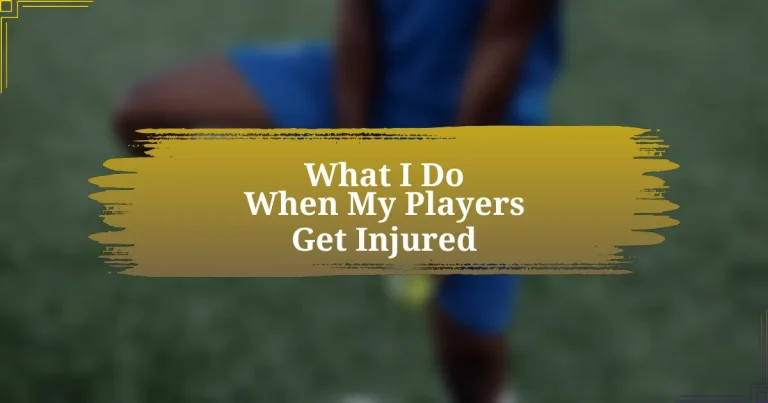Key takeaways:
- Injuries significantly impact fantasy football performance, requiring managers to stay informed and make strategic decisions based on recovery timelines.
- Having a solid backup plan, being proactive in trades, and scouting the waiver wire are essential strategies for managing injured players.
- Analyzing matchups and leveraging insights from leaguemates can lead to discovering valuable replacement players during injury crises.
- Injuries can be challenging but also provide opportunities for creativity and strategic planning, which can lead to unexpected victories.
Author: Emma Hartley
Bio: Emma Hartley is an accomplished author known for her compelling narratives that explore the complexities of human relationships and societal themes. With a background in psychology and literature, her work often fuses emotional depth with sharp wit, captivating readers around the world. Emma’s novels have earned critical acclaim and numerous awards, solidifying her place in contemporary fiction. When she’s not writing, she enjoys hiking and volunteering with local literacy programs. Emma resides in Seattle with her two rescue dogs, and she is currently working on her next novel.
Understanding Fantasy Football Injuries
In the world of fantasy football, injuries can be both a heart-wrenching and strategic dilemma. I remember a season when my star running back went down with a surprising ankle injury just before a playoff game. That moment reminded me how quickly fortunes can change in this game; one player’s injury can shift the entire landscape of a fantasy league.
Understanding the nature of injuries is crucial for any fantasy football manager. Have you ever wondered how the duration of a player’s recovery impacts your squad’s performance? For example, a high ankle sprain can sideline a player for weeks, while a minor knee tweak might see them back in action within days. Knowing the specifics can help you make informed decisions, especially during crucial matchups.
Keeping an eye on injury reports is part of being a successful fantasy manager. I became adept at monitoring updates and analyzing a team’s medical staff’s reputation. There have been times when players surprise us, returning early from injuries, and I always ask myself: was it worth the risk to hold onto them, or should I have moved on? Understanding the nuances of these situations is vital for building a resilient team that can weather the inevitable storms of injuries.
Strategies for Managing Injured Players
I’ve learned that having a solid backup plan is non-negotiable in fantasy football. One season, I invested heavily in a promising rookie, only to see him sidelined after just a few weeks. I quickly scrambled to pick up another running back who was unexpectedly performing well, which saved my season. It’s crucial to scout for reliable substitutes who can step in whenever injury strikes.
Another strategy that’s served me well is staying proactive about transactions. If I sense a player is dealing with an injury that could linger, I don’t hesitate to put out some feelers in trade talks. I remember when a key wide receiver on my roster had a nagging hamstring issue; I capitalized on a trade opportunity and swapped him out for someone who was on a roll. It’s all about anticipating the future needs of your team, and sometimes making the hard choices pays off.
Finally, I always keep an eye on waiver wire opportunities. There was a time when a nobody from another team stepped into a starting role after an injury and became a weekly gem. Who would have thought that picking up a third-string player would lead me to unexpected points? This is why I pay attention to matchups and depth charts, knowing that opportunity is just as valuable as talent in this unpredictable game.
How to Find Replacement Players
When searching for replacement players, I often start by analyzing the matchups. I recall a season where I lost my star quarterback just before a critical matchup against a weak defense. Instead of panicking, I quickly reviewed the waiver wire and found a backup who was set to face that same weak team. That gamble paid off big time with a surprising performance that not only salvaged my week but also kept my playoff hopes alive.
In my experience, checking player trends during the week can reveal hidden gems. For instance, I once noticed a running back gaining traction on social media—his performance had been steadily improving, and he was featured in a favorable matchup. I grabbed him before others recognized his potential. The excitement of finding that next breakout star is one of the most rewarding aspects of fantasy football.
Also, don’t underestimate the power of leaguemates for insights. I remember in a close-knit league, a friend mentioned his concerns about a player’s health. Surprisingly, he opened up about a solid replacement he had picked up. This interaction sparked my interest, leading me to make a timely claim that turned out to be a game-changer. Staying connected and exchanging information can often lead to discovering replacements that nobody else is considering.
Personal Experience with Player Injuries
Over the years, I’ve faced my fair share of player injuries, and it never gets easier. One memorable incident was when my top wide receiver went down with a hamstring injury right before the playoffs. I felt a wave of panic wash over me—how could I replace that production? In moments like these, I lean on my instincts and gut feelings about players. Sometimes, you just have to trust your research and make a bold move.
A few seasons back, I lost a key running back to a season-ending injury early on. I remember sitting on my couch, staring at my roster, feeling defeated. Yet, I decided to pivot and searched for under-the-radar players. I found a rookie who was slated to see a substantial increase in carries. It felt risky, but that decision not only helped me survive that season but also reignited my passion for strategizing.
Injuries can be devastating, but they also offer an opportunity for creativity. I once had to fill multiple slots due to injuries late in a season. Instead of dwelling on my misfortunes, I devised a plan to stream positions based on matchups. The thrill of pulling off that strategy and watching my team turn around was an emotional rollercoaster. Have you ever turned a tough situation into a surprising win? Those moments reinforce why I love this game so much.














